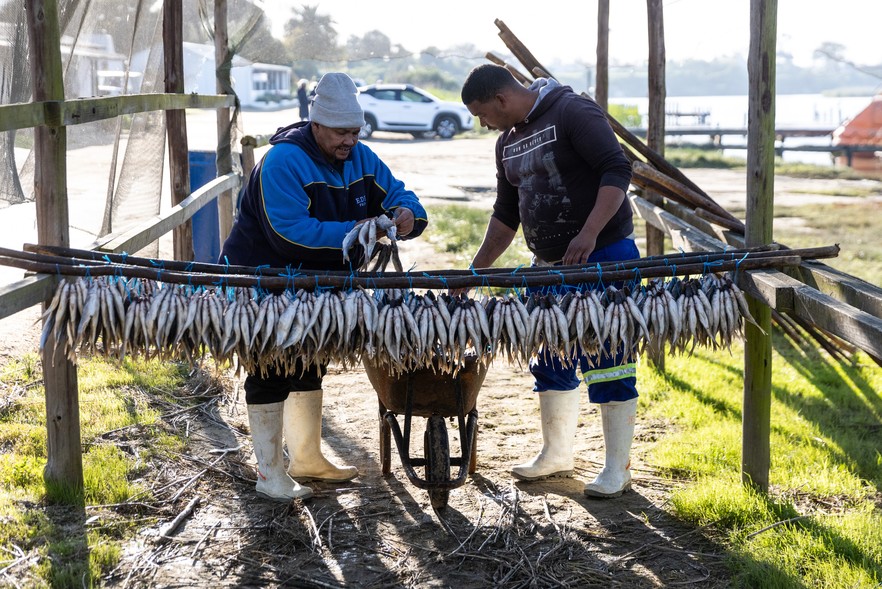
9 September 2024
Amos Jantjies and Luwellon Albridge of Ubuntu Visserye, on the historic Bokkomlaan in Velddrif, hang up the bokkoms to dry.
Known as the “bokkom capital” of the world, Velddrif is a small fishing town on the West Coast where a type of fish biltong called “bokkoms” (a salted and dried harder fish) is sold from Bokkomlaan, next to the road, outside shops, and from people’s homes.
After a severe winter, the historic Bokkomlaan, a road in Velddrif on the banks of the Berg River is again selling bokkoms, a West Coast delicacy, by the thousands.
Bokkomlaan is a heritage site and one of the oldest roads in Velddrif.
Several fish houses drying and selling bokkoms operate from Bokkomlaan. Thousands of bokkom bunches (called “bossies”) are dried here each week if the weather permits it.
“We hope for about 1,000 bossies a week,” said Amos Jantjies of Ubuntu Visserye, who has been working on Bokkomlaan for over 30 years.
The fish is left in a salt water mixture for a few days.
The fish are then strung onto thread in “bossies” of ten.
The small silver fish is soaked in salt water mixture for days before it is strung up and hangs outside for a day. Then it is taken inside the fish house to dry.
“This time of year it takes a month to dry,” said Jantjies. In summer, it will take only one week. Jantjies said bokkom used to be a staple food in the area but wasn’t anymore.
There were once about 22 fish houses on Bokkomlaan, but the number has dropped to about four, according to Felicity Strohfeldt, a curator at the local SA Fisheries Museum.
After the fish are rinsed, Luwellon Albridge takes the bunches outside where they are left to dry in the wind and sun.
The price of bossies ranges between R20 and R30 for a thread of ten.
The dried fish can be found all over Velddrif, and is sold in shops and alongside the road. Renier, also known as “Die Kaas Oom” (he did not want to give his surname) sells handmade cheese, honey and bokkoms from the side of the road in Velddrif. He has been doing this for years.
But despite the shrinking industry, Velddrif resident Velancia Dampies and her husband Jowinel Dampies have created a thriving business delivering hundreds of bokkom bossies in towns outside of the town, with clients from Paarl, Porterville, Tulbagh, Gouda, and Wellington.
Dampies said she took on her uncle’s business about two years ago. “It’s very hard work. But you enjoy it. If you do it with love, then why not?” said Dampies. She said that it is rewarding when their clients receive their orders with joy and gratitude.
They buy the fish from local fishers, hang them and dry them at their house, with the help of about six people. Every Sunday they deliver orders. The Sunday she is delivering about 130 bossies and her husband about 200 to 300.
When GroundUp visited, workers were busy emptying the bokkoms out of the salt water pit and three women were busy stringing the fish through their eyes onto thread. They also have space for hanging their fish in Bokkomlaan when they have too much fish for the beams already set up at their home, which can take at most 1,300 bossies.
Left to right: Jennifer Farao, Levodia Farao and Loziala Farao string and bunch up fish at the Dampies’ home.
Loziala Farao ties the fish into bunches.
Dampies said that the fishers who go out to catch harders can sometimes come back empty-handed. The bokkom fishers who go out to catch the harders “don’t go far out”, said Strohfeldt. “They have to spend the night out and hope they catch something. They come back at more or less 5AM in the morning,” she said.
Strohfeldt said that the bokkom industry and the Oceana factory in Velddrif has been good for employment in the fishing town.
This is confirmed by a recent Western Cape government report which states that the primary source of jobs in Velddrif is fishing and aquaculture.
The Dampies are looking forward to summer when business will be very good. But for now, “if the weather allows, our guys will go out. They know the time and the wind,” she said.
The salt is washed off before the fish are hung out to dry.
Ranaluin Baron hangs the fish up to dry.
Once the head and tail are removed and the skin peeled off, the bokkom is ready to eat.